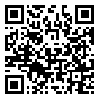Volume 12, Issue 4 (1-2025)
JRIA 2025, 12(4): 0-0 |
Back to browse issues page
Download citation:
BibTeX | RIS | EndNote | Medlars | ProCite | Reference Manager | RefWorks
Send citation to:



BibTeX | RIS | EndNote | Medlars | ProCite | Reference Manager | RefWorks
Send citation to:
Noghrekar A, Noghrekar S. (2025). Evaluation and Positioning of "Islamic Particularist and Holistic Research Methods"; Target Audience: Researchers and Practitioners in the Fields of Arts, Architecture, and Urban Planning. JRIA. 12(4), doi:10.61186/jria.12.4.7
URL: http://jria.iust.ac.ir/article-1-1784-en.html
URL: http://jria.iust.ac.ir/article-1-1784-en.html
1- Iran University of Science and Technology
2- Shahid Rajaee Teacher Training University
2- Shahid Rajaee Teacher Training University
Abstract: (1220 Views)
A suitable and effective research methodology serves as a primary guide for humankind in understanding and uncovering the nature of existence, the truths of "the world and humanity," and their interconnections, ultimately facilitating humanity's journey toward higher purpose and ensuring their lasting well-being and eternity. Unfortunately, in recent centuries, Western culture, having distanced itself from "divine doctrines" and adopting a strictly materialistic approach to "the world and humanity" that views human beings through an animalistic lens, has established a "particularist" research method—rooted in "sensory, empirical, instinctual, and statistical" approaches—within educational and research institutions globally. This methodology excels in identifying the "material and formal" causes of natural phenomena, enabling the Industrial Revolution and fostering "power and wealth" for Western countries, often at the cost of "exploitation, colonization, and enslavement of other nations." However, these advancements have simultaneously led to "alienation and dehumanization of people worldwide," creating environmental crises, class conflicts, depression, hopelessness, and rising suicide rates, among other issues. In contrast, the Almighty, through the mission of all His prophets, has highlighted the unique "rational and spiritual" attributes of humans that distinguish them from animals. By providing infallible sources and foundations—namely, the "Quran and the traditions of the infallibles"—He has introduced a research approach that emphasizes the "holistic and all-encompassing Islamic" methodology, which is especially oriented toward explaining humanity’s "elevated and eternal journey" and the achievement of a virtuous life. This article evaluates, compares, and contextualizes the above two methods by employing "logical reasoning and interpretive" techniques based on the infallible Islamic sources of the "Quran and authentic traditions." Reforming research methodology courses in universities is a critical and essential step toward the Islamization of universities, aligning with the Supreme Leader's strategic vision of "establishing a new Islamic civilization with an Islamic-Iranian identity" and avoiding the "translation and imitation" of Western culture, which is incomplete, deviant, anti-humanistic, and counter-evolutionary.
Keywords: Western particularist research method, Islamic holistic research method, Quran and traditions of the infallibles, human alienation, evolutionary journey of humanity.
Type of Study: Research |
Subject:
Research methodology in Islamic architecture and urbanism
Received: 2024/10/30 | Accepted: 2024/12/24 | Published: 2024/12/28
Received: 2024/10/30 | Accepted: 2024/12/24 | Published: 2024/12/28
References
1. قرآن کریم.
2. انجیلهای چهارگانه.
3. ابن بابویه، محمد بن علی (بدون تاریخ)، عیون أخبار الرضا علیه السلام، تصحیح مهدی لاجوردی، جلد2.
4. خسروپناه (1389)، نظریۀ علم دینی از آیتالله جوادی آملی، فصلنامۀ اسرا، شمارۀ 2.
5. شیخ صدوق، محمد بن علی (1395 هجری)، کمال الدین و تمام النعمه، ناشر: اسلامیه تهران، تهران، الطبعه الثانیه.
6. فیض کاشانی (1406 هجری)، الوافی، ناشر: مکتبه الإمام أمیرالمؤمنین علی (علیه السلام) العامه، اصفهان، جلد 1.
7. کلینی، محمد بن یعقوب (1363)، الکافی، مصحح: علی اکبر غفاری، ناشر: دار الکتب الإسلامیه، تهران، جلد 1 و جلد 6.
8. مجلسی، محمدباقر (1983)، بحارالانوار، ناشر: دار إحیاء التراث العربی، بیروت، جلد 97.
9. مطهری، مرتضی (1370)، جهان بینی توحیدی: مقدمهای بر جهان بینی اسلامی، ناشر: صدرا، تهران.
10. نقرهکار، سلمان (1400)، چهل گام تا تدوین مکتب معماری اسلامی: در جستوجوی الگویی برای بهرهمندی جامع از آموزههای حکمت اسلامی در معماری، مجلۀ پژوهشهای معماری اسلامی. دورۀ 9، شمارۀ 4.
11. نقرهکار، سلمان (1403)، رهپویی، راهنمایی و داوری پایان نامه، ناشر: دانشگاه تربیت دبیر شهید رجایی، چاپ اول.
12. نقرهکار، عبدالحمید (1396)، نظریۀ نسبت اسلام با فرایندهای انسانی (معماری و شهرسازی)، شورای عالی انقلاب فرهنگی، تهران.
13. نقرهکار، عبدالحمید (1400)، حکمت اسلامی در خلق آثار هنری، معماری و شهرسازی، انتشارات سروش، تهران.
14. نقرهکار، عبدالحمید (1401)، حکمت اسلامی در خلق آثار هنری، معماری و شهرسازی، چاپ دوم، انتشارت سروش، تهران.
15. https://fa.wikishia.net/view/%D8%A7%D9%85%D8%B1_%D8%A8%DB%8C%D9%86_%D8%A7%D9%84%D8%A7%D9%85%D8%B1%DB%8C%D9%86. دسترسی در تاریخ 5 آبان 1403
16. The Holy Quran.
17. The Four Gospels.
18. Ibn Babawayh, Muhammad ibn Ali (n.d.), Uyūn Akhbār al-Riḍā (Peace be upon him), edited by Mahdi Lajvardi, Vol. 2.
19. Khosrowpanah (2010), "The Theory of Religious Knowledge by Ayatollah Jawadi Amoli," Asra Quarterly, No. 2.
20. Shaykh Ṣadūq, Muhammad ibn Ali (1975), Kamal al-Din wa Tamam al-Ni'mah, Tehran: Islamic Publishing House, 2nd edition.
21. Fayz Kashani (1985), Al-Wafi, Isfahan: Imam Amir al-Mu'minin Ali (Peace be upon him) Public Library, Vol. 1.
22. Kulayni, Muhammad ibn Ya'qub (1984), Al-Kafi, edited by Ali Akbar Ghafari, Tehran: Dar al-Kutub al-Islamiyyah, Vols. 1 and 6.
23. Majlisi, Muhammad Baqir (1983), Bihar al-Anwar, Beirut: Dar Ihya al-Turath al-Arabi, Vol. 97.
24. Motahhari, Morteza (1991), Monotheistic Worldview: An Introduction to the Islamic Worldview, Tehran: Sadra.
25. Noghrekar, Salman (2021), "Forty Steps to Formulating an Islamic Architectural School: In Search of a Comprehensive Model Utilizing Islamic Wisdom in Architecture," Islamic Architectural Research Journal, Vol. 9, No. 4. [DOI:10.52547/jria.9.4.8]
26. Noghrekar, Salman (2024), Guidance and Assessment of Theses, Tehran: Shahid Rajaee Teacher Training University, 1st edition.
27. Noghrekar, Abdolhamid (2017), Theory of Islam's Relation to Human Processes (Architecture and Urban Planning), Supreme Council of the Cultural Revolution, Tehran.
28. Noghrekar, Abdolhamid (2021), Islamic Wisdom in the Creation of Artistic, Architectural, and Urban Works, Tehran: Soroush Publications.
29. Noghrekar, Abdolhamid (2022), Islamic Wisdom in the Creation of Artistic, Architectural, and Urban Works, 2nd edition, Tehran: Soroush Publications.
30. https://fa.wikishia.net/view/%D8%A7%D9%85%D8%B1_%D8%A8%DB%8C%D9%86_%D8%A7%D9%84%D8%A7%D9%85%D8%B1%DB%8C%D9%86 (accessed October 26, 2024).
Send email to the article author
| Rights and permissions | |
 |
This work is licensed under a Creative Commons Attribution-NonCommercial 4.0 International License. |






